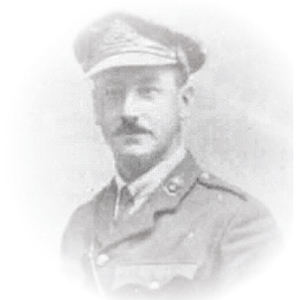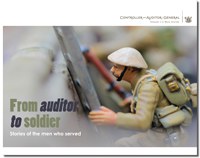John Charles Amphlett Dudley
 John Charles Amphlett Dudley was from Wellington. He joined the Audit Department in February 1894. At the outbreak of WW1, he had attained a senior position in the Department – Audit Inspector, Class IV, Nelson. He was 34 years old when he joined the New Zealand Expeditionary Force in June 1915.
John Charles Amphlett Dudley was from Wellington. He joined the Audit Department in February 1894. At the outbreak of WW1, he had attained a senior position in the Department – Audit Inspector, Class IV, Nelson. He was 34 years old when he joined the New Zealand Expeditionary Force in June 1915.
After joining, John became concerned about ensuring that his mother and sister would be adequately provided for in the event of his death.
An approach must have been made to the Prime Minister about these concerns because the Prime Minister wrote to the Minister of Defence on 7 November 1915 about John’s situation:
Mr John Dudley, Audit Department, who has volunteered for active service, was in Hokitika last week saying farewell to his personal friends. He has a mother and a sister, and to provide for them in the event of his death he has insured his life for a substantial sum of money, and his premium is 56 pounds per year. Dudley is now a corporal in the Eighth Artillery at Trentham. He is a man with a good education, fine appearance and address and full of enthusiasm and he seems to have all the qualifications for an officer. Could he not be allowed to sit for the examination so that he might obtain a commission? His pay would then enable him to pay his life premium and provide for his mother and sister.
In 1914, John was paid £360 a year. His insurance premium would represent about two months’ salary.
The Minister of Defence replied to the Prime Minister in December 1915, pointing out that John had been appointed to the position of Sergeant Major in the 10th Reinforcements Artillery. The Minister of Defence addressed the issue of sitting the examinations to become an officer and said:
I have to inform you that non-commissioned officers are provided with every facility for advancing themselves to commissioned rank though at present the supply of officers for the artillery is ample.
The Minister went to say that “I think you will agree that Sergeant Major Dudley’s friends may already congratulate him on his enterprise and efficiency in obtaining such rapid promotion.”
John did succeed in becoming a commissioned officer and was appointed to the rank of 2nd Lieutenant, by notice in the New Zealand Gazette of 9 March 1916.
John was sent to Egypt on 22 February 1916, as part of the New Zealand Field Artillery Brigade, and then on to France in April 1916. He was attached to the Brigade Headquarters at the town of Étaples on the coast of northern France. He was then with the 2nd Brigade, 5th Battery, from early September 1916 to February 1917. The 2nd Brigade was involved in the Battle of the Somme in September 1916. It is likely that John would have been in action at the Somme.
He was transferred back to the New Zealand Division’s base at Étaples, the principal transit camp for the British Expeditionary Force heading to the Western Front. Étaples was later identified by the British virologist John Oxford as one of the possible sites for the origins of the 1918 influenza pandemic that eventually killed millions of people around the world. There was a major outbreak at Étaples in 1915/16 of a new type of respiratory infection.
Étaples was said to have the ideal conditions for the outbreak of a new type of influenza, with thousands of troops, pigs, and fowl all kept in close quarters.
John caught this new type of influenza and was hospitalised in January 1917. He was discharged to a convalescent home in February 1917. After recovering from his illness, he returned to the Brigade headquarters and was posted back to his unit in May 1917. His recovery was not complete. In July 1917, John was sent to a rest home for officers in the United Kingdom and was granted leave in September and November 1917 and again in January 1918. He was promoted to the rank of Lieutenant in September 1917. After a further period at Brigade headquarters, he was posted back to his unit in July 1918.
John served briefly with the Allied occupation forces in Germany at the end of the war. On 16 February 1919, he became seriously ill and was admitted to hospital in Cologne, Germany. John died of pneumonia on 22 February 1919.
John was posthumously awarded the British War Medal and the Victory Medal.

